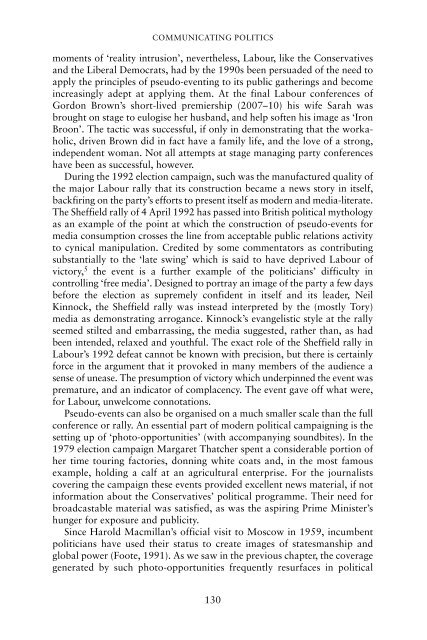20130412164339753295_book_an-introduction-to-political-communication
20130412164339753295_book_an-introduction-to-political-communication
20130412164339753295_book_an-introduction-to-political-communication
Create successful ePaper yourself
Turn your PDF publications into a flip-book with our unique Google optimized e-Paper software.
COMMUNICATING POLITICS<br />
moments of ‘reality intrusion’, nevertheless, Labour, like the Conservatives<br />
<strong>an</strong>d the Liberal Democrats, had by the 1990s been persuaded of the need <strong>to</strong><br />
apply the principles of pseudo-eventing <strong>to</strong> its public gatherings <strong>an</strong>d become<br />
increasingly adept at applying them. At the final Labour conferences of<br />
Gordon Brown’s short-lived premiership (2007–10) his wife Sarah was<br />
brought on stage <strong>to</strong> eulogise her husb<strong>an</strong>d, <strong>an</strong>d help soften his image as ‘Iron<br />
Broon’. The tactic was successful, if only in demonstrating that the workaholic,<br />
driven Brown did in fact have a family life, <strong>an</strong>d the love of a strong,<br />
independent wom<strong>an</strong>. Not all attempts at stage m<strong>an</strong>aging party conferences<br />
have been as successful, however.<br />
During the 1992 election campaign, such was the m<strong>an</strong>ufactured quality of<br />
the major Labour rally that its construction became a news s<strong>to</strong>ry in itself,<br />
backfiring on the party’s efforts <strong>to</strong> present itself as modern <strong>an</strong>d media-literate.<br />
The Sheffield rally of 4 April 1992 has passed in<strong>to</strong> British <strong>political</strong> mythology<br />
as <strong>an</strong> example of the point at which the construction of pseudo-events for<br />
media consumption crosses the line from acceptable public relations activity<br />
<strong>to</strong> cynical m<strong>an</strong>ipulation. Credited by some commenta<strong>to</strong>rs as contributing<br />
subst<strong>an</strong>tially <strong>to</strong> the ‘late swing’ which is said <strong>to</strong> have deprived Labour of<br />
vic<strong>to</strong>ry, 5 the event is a further example of the politici<strong>an</strong>s’ difficulty in<br />
controlling ‘free media’. Designed <strong>to</strong> portray <strong>an</strong> image of the party a few days<br />
before the election as supremely confident in itself <strong>an</strong>d its leader, Neil<br />
Kinnock, the Sheffield rally was instead interpreted by the (mostly Tory)<br />
media as demonstrating arrog<strong>an</strong>ce. Kinnock’s ev<strong>an</strong>gelistic style at the rally<br />
seemed stilted <strong>an</strong>d embarrassing, the media suggested, rather th<strong>an</strong>, as had<br />
been intended, relaxed <strong>an</strong>d youthful. The exact role of the Sheffield rally in<br />
Labour’s 1992 defeat c<strong>an</strong>not be known with precision, but there is certainly<br />
force in the argument that it provoked in m<strong>an</strong>y members of the audience a<br />
sense of unease. The presumption of vic<strong>to</strong>ry which underpinned the event was<br />
premature, <strong>an</strong>d <strong>an</strong> indica<strong>to</strong>r of complacency. The event gave off what were,<br />
for Labour, unwelcome connotations.<br />
Pseudo-events c<strong>an</strong> also be org<strong>an</strong>ised on a much smaller scale th<strong>an</strong> the full<br />
conference or rally. An essential part of modern <strong>political</strong> campaigning is the<br />
setting up of ‘pho<strong>to</strong>-opportunities’ (with accomp<strong>an</strong>ying soundbites). In the<br />
1979 election campaign Margaret Thatcher spent a considerable portion of<br />
her time <strong>to</strong>uring fac<strong>to</strong>ries, donning white coats <strong>an</strong>d, in the most famous<br />
example, holding a calf at <strong>an</strong> agricultural enterprise. For the journalists<br />
covering the campaign these events provided excellent news material, if not<br />
information about the Conservatives’ <strong>political</strong> programme. Their need for<br />
broadcastable material was satisfied, as was the aspiring Prime Minister’s<br />
hunger for exposure <strong>an</strong>d publicity.<br />
Since Harold Macmill<strong>an</strong>’s official visit <strong>to</strong> Moscow in 1959, incumbent<br />
politici<strong>an</strong>s have used their status <strong>to</strong> create images of statesm<strong>an</strong>ship <strong>an</strong>d<br />
global power (Foote, 1991). As we saw in the previous chapter, the coverage<br />
generated by such pho<strong>to</strong>-opportunities frequently resurfaces in <strong>political</strong><br />
130
















